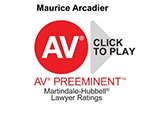Bankruptcy: It's less painful than you think
The thought of filing for Bankruptcy can be stressful and intimidating because generally people outside of the process don not know how it works. How much property can I keep? Will my creditors come after me? What's going to happen to my retirement, my house, my car? How long is my credit affected? How long does the entire process take?

These are all common questions regardless of whether you are filing a Chapter 7 or a Chapter 13 Bankruptcy. The answers however can be somewhat complicated based on your income and what goals you have. If you have a feeling that Bankruptcy is in your future due to separation from work, loss of working hours, foreclosure, illness, divorce, or for any other reason you should contact an attorney before making any major financial decisions. Remember that our bankruptcy consultations are free, and the key to any successful legal endeavor is careful planning in order to maximize your ability to achieve your goals. An attorney provides you with knowledge and experience to avoid mistakes and guide you through the bankruptcy process.
Each bankruptcy has a trustee who will oversee the administration of your case. It is the trustee's job to make sure that your filed documents are in compliance with the law, that your property is correctly categorized and valued, and to also verify your identity. A trustee has the ability to dispute your valuations and characterizations of property, in those cases a trustee could be your adversary. In a Chapter 7 Bankruptcy the trustee is also responsible for selling your assets in certain cases where those assets cannot be protected. In a Chapter 13 Bankruptcy the trustee is also responsible for making sure that you stick to the repayment plan.
Liquidation more commonly referred to as Chapter 7 Bankruptcy is a selling of your assets in order to satisfy your outstanding debts. However you can choose to protect your property from sale with what is called an exemption. Deciding how and what property to protect from creditors depends on what kind of property it is. Did you know that retirement accounts no matter what the amount are generally safe? That is why cashing out to pay credit cards and other bills is such a terrible idea. The same thing goes for social security, disability, child support, alimony, etc. In most cases the average individual should keep all of their property.
In a bankruptcy case where you keep your assets a Chapter 7 case will last approximately three months from the date the case is filed until the date the Court closes the case. Any bankruptcy will remain on your credit for up to 10 years however for most people this will not be significant hurdle to obtaining new credit because many banks and credit unions have credit rebuilding programs.
Chapter 7
A Chapter 7 Bankruptcy where the filer has assets could last for a slightly longer period of time. The most common cases are when a filer has a vehicle with equity, typically a boat, motorcycle, or car. In this scenario the vehicle will be sold however you will almost always have the first option to buy back the property if you so choose. You will usually be asked to pay a monthly installment until the equity is paid in full. It is almost always more beneficial to have a vehicle that is upside down during a bankruptcy because the those cases the value of the asset is zero. So if you are in financial distress do not try and use your savings to pay off a house, vehicle, or other secured debt.
If you are having a difficult time with your mortgage bankruptcy can be helpful because you no longer have to waste your income on medical or credit card debt. Even if you file bankruptcy you won't be prevented from modifying your mortgage. More information on Chapter 7.
Chapter 13

Chapter 13 Bankruptcy is a Reorganization of your debts. A person will choose to file under the reorganization chapter when they are earning money higher than an average family or own a significant amount of property. The Bankruptcy Court will approve a reorganization of your debts into a manageable five year payment plan. You will only be required to pay what you can afford, and at the end of five years any remaining debts you could not fully pay off are wiped clean. This is a better scenario than making minimum payments because you will not be trapped into never ending payments that do not even cover interest. The reorganization payback plan is similar to the Chapter 7 buyback plan explained above however it goes on for a much longer period of time and is calculated in a different way because we are dealing with significantly more money. More information on Chapter 13.
Please be advised that this article cannot be all inclusive because the actual Bankruptcy Code is maze of rules and exceptions to those rules that are interpreted differently depending on what part of the country you live in. Also property protection rules vary greatly depending on what state you may live in. If you are thinking about bankruptcy you should always consult with an attorney before making any major financial decisions. And bankruptcy with a lawyer is affordable. Let Arcadier and Associates help you. We are conveniently located in Boca Raton, Florida.





